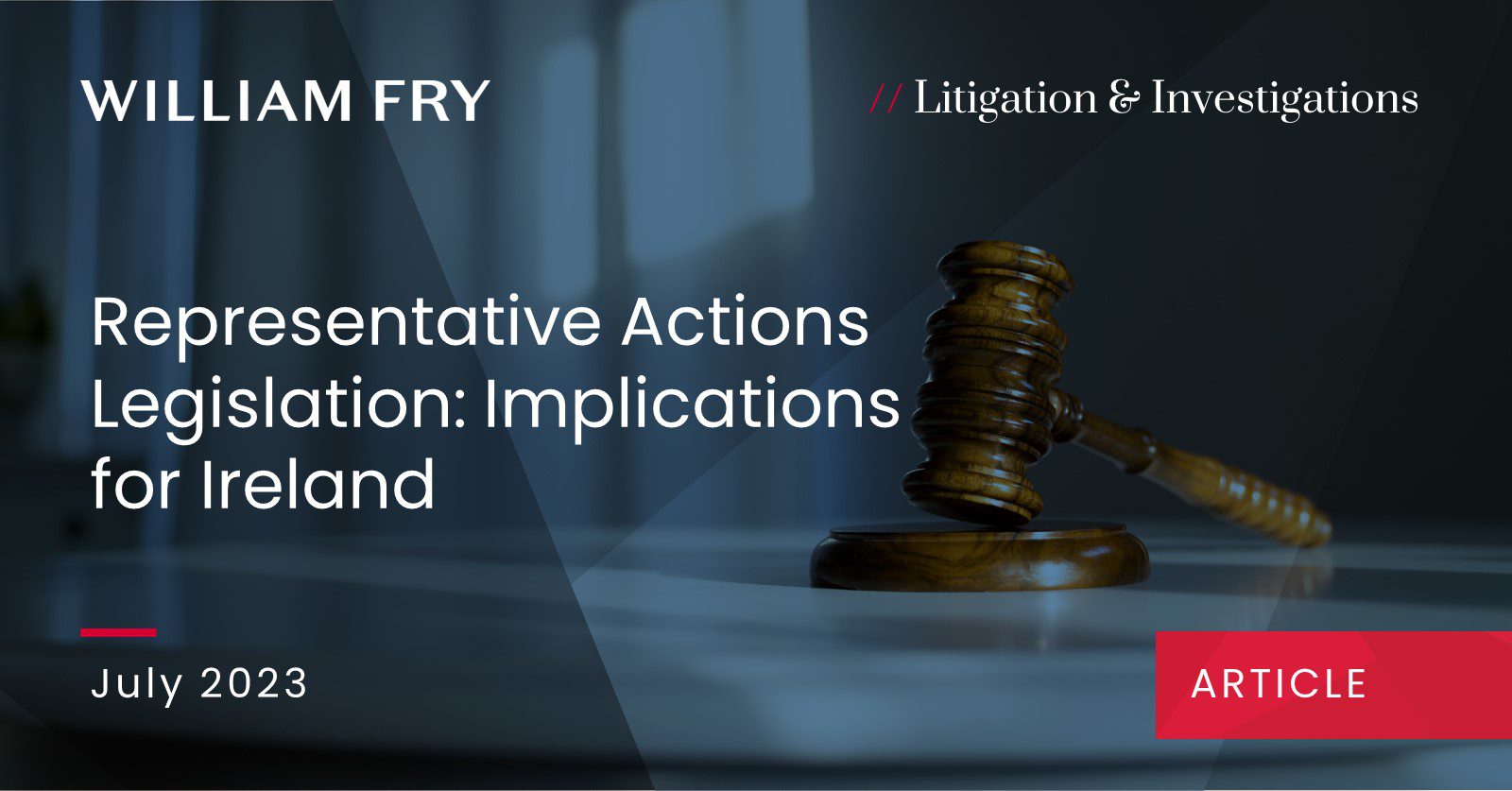On 11 July 2023, the President of Ireland signed into law the Representative Actions for the Protection of the Collective Interests of Consumers Act 2023 (Act), transposing European Union Directive (EU) 2020/1828 (Directive).
A commencement order is awaited to bring its provisions into operation.
When commenced, the Act will enable consumers to seek collective redress and provide effective remedies where they are harmed by traders’ violations of EU consumer protection law.
What does this mean for Ireland?
The Act introduces a type of class action in Ireland whereby qualified entities (QE’s) are empowered to bring “Representative Actions” against traders on behalf of consumers whose rights have been breached in Ireland or other EU member states. A Representative Action is one for the protection of the collective interests of consumers brought by a QE.
A trader is “defined as meaning “any natural person, or any legal person…that acts…for purposes relating to that person’s trade, business, craft or profession.”
The Act applies to infringements of a broad range of national provisions transposing EU legislation which protect consumers interests and are set out in the Schedule to the Act. Legislation covered includes the Data Protection Act 2018, parts of the Consumer Protection Act 2007 and sections of the Consumer Rights Act 2022, in addition to financial services and general products safety regulations. It repeals the EC (Court Orders for the Protection of Consumer Interests) Regulations 2010, which allowed qualified bodies from member states to seek injunctive relief before the Irish Circuit Court for infringements of certain consumer protection legislation.
Representative Actions can be brought for domestic and cross-border infringements that occur on or after 25 June 2023.
Who can bring an action?
Affected consumers can only be represented by organisations designated by the Minister for Enterprise, Trade and Employment (Minister), as a QE. A QE must:
- Be a legal person capable of demonstrating 12 months of public activity in protecting consumers interests;
- Have a legitimate interest in protecting consumers’ interests;
- Be non-profit making and solvent;
- Be independent;
- Make publicly available certain information, including confirmation of their compliance, information about the source of its funding, its statutory purpose and activities.
A register of QE’s will be maintained by the Minister and the designation of such QE’s will be reviewed at least once every five years.
What reliefs are available?
QE’s may apply to the High Court (Court) for injunctive relief and/or redress measures.
Consumers will be required to expressly opt-in to seek redress measures as part of the Representative Action which are subject to a discretionary power of the High Court and may include:
- Compensation
- Repair
- Replacement
- Price Reduction
- Contract Termination; and
- Reimbursement.
Individual consumers will not be required to opt-in where injunctive relief is sought.
What safeguards are in place?
Settlements:
Settlements are expressly provided for under the Act. It is open to the Court to invite the parties to reach a settlement. Settlements are subject to court approval, binding the QE, the Trader and the consumers.
Funding:
The Act permits third-party funding insofar as is it is “in accordance with law”. Under Irish law, third party funding is prohibited under the torts of maintenance and champerty (see our previous article here). An amendment to the legislation was proposed at Committee stage to disapply maintenance and champerty rules to the Act, but this amendment was not adopted. The wider issue of third-party funding in Ireland is a matter for the Irish Parliament and the Law Reform Commission has just published a Consultation Paper on third-party litigation funding, which remains open until 3 November 2023.
As a result, the not-for-profit QE will be responsible for the cost of funding the litigation. The Directive requires member states to ensure that lack of funding is not a bar to bringing a Representative Action. For the Act to have a meaningful impact, the restriction on third-party funding will likely need to be reconsidered.
More generally, funding safeguards are in place under the Act to prevent conflicts of interest and to ensure that the economic interests of the any third-party funders does not adversely affect the protection of the consumers’ interests. In that regard, the Court must ensure that decisions of QEs, including decisions on settlements, are not unduly influenced by any third party. QEs are also required to disclose the source of funds used to support a Representative Action.
QEs are permitted to charge a “modest fee” to consumers to join a Representative Action.
Costs:
The unsuccessful party in a Representative Action will be required to pay the costs of the proceedings.
Double recovery:
Consumers will need to sign a declaration binding them to the outcome of the action and precluding any other action against the Trader for the same cause of action. However, consumers who do not opt-in to a Representative Action retain the right to bring their own individual action.
Concluding thoughts:
As observed by the Minister of State at the Department of Enterprise, Trade and Employment speaking at the Second Stage Reading in the Seanad, the Act does not create any new rights for consumers or place additional liabilities on traders. Its significance lies in the fact that once commenced, it will allow consumers to act collectively with others, on a cross-border basis, to protect their rights. Although existing procedures under the court rules allow for multi-party actions before the Irish courts, a crucial difference under the Representative Action mechanism is that the consumers will be bound by the outcome of the litigation.
Contributed by Emily Sugrue & Gail Nohilly



